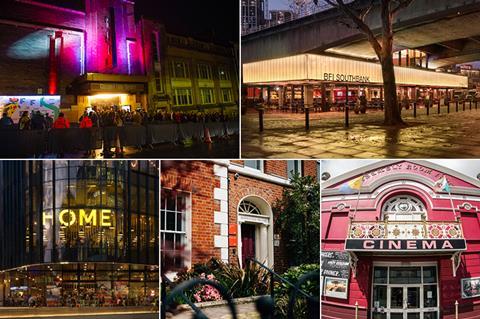
After more than four months of closures, cinemas in the UK are preparing to reopen from Monday (May 17).
Restrictions will remain in place, with a one-metre social distancing rule in England meaning attendance will be capped at 50%, while a two-metre rule in Scotland, Wales and Northern Ireland translates into even fewer available seats.
But the industry is hopeful that the capacity cap in England will be removed from June 21, even if face coverings and the collection of test and trace details remain a reality for the foreseeable future.
Ahead of reopening, Screen spoke with five independent venues across the country, which revealed their plans for resuming business while reflecting on a “brutal” period for the exhibition sector.
England
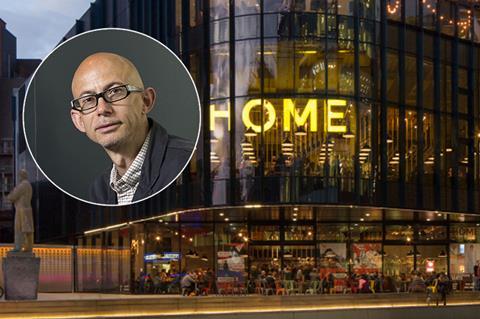
Jason Wood, artistic director, film and culture, HOME, Manchester
What date are you reopening and with which films?
We re-open May 17, the earliest date the government allows. Confirmed titles are: Judas And The Black Messiah, Minari, Nomadland, Sound Of Metal, Rare Beasts, County Lines, Polystyrene – I Am Cliché, Muscle, Undergods, Quo Vadis, Aida?, Spring Blossom, Apples, The Human Factor and State Funeral. We have Billie Piper coming for an in-person Q&A for Rare Beasts and recorded director intros for County Lines, Ammonite, Muscle and Polystyrene – I Am Cliché.
How are you preparing ahead of reopening your doors?
We have the benefit of experience, as we opened on September 4 after the first lockdown, and will be operating with the utmost priority for the safety of audiences and staff. This includes reduced seating to allow for social distancing, mandatory mask-wearing, increased deep cleaning in the building and between shows, and other procedures.
What problems do you foresee reopening under the current restrictions?
The financial impact is obviously seismic. We are operating with two-metre social distancing so go from being able to sell over 500 cinema tickets to just over 100. Thankfully, we have received funding support from the BFI and the Culture Recovery Fund. But there is obviously an issue with satisfying demand as audience feedback and recent surveys show that a return to the cinema figures very high on people’s planning.
How would you describe the impact of the past year on your cinema?
It has been brutal for all cinemas and for culture in general. Before the pandemic hit, HOME was enjoying record attendances. The success of films like Nomadland, Minari, Sound of Metal and others at high profile awards has given independent cinema a chance to thrive and allowed for a more diverse and inclusive film culture. Let’s hope that continues.
What do you have planned to encourage people back to the screen?
A genuinely brilliant and diverse programme that reflects the best in world cinema and which is engaging, entertaining, accessible but also not afraid to deal with pressing social and political issues. Also, some guest introductions, our customarily accessible price point and staff that will be doing everything to make audiences feel both welcome and safe.
Is there anything that has come out of the past year that you think you might want to carry over?
We need to remember that film is an eco-system and - as well as Hollywood blockbusters - we also need independent films, foreign language films, archive films and documentaries. I think audiences should also remember those organisations that treated their staff fairly and those that didn’t. How and where you choose to spend your money can be a political act.
We also need to remember that there is life outside London. Sending screening links to programmers and writers not based in London shouldn’t stop just because London preview theatres are open again. Also, online is here to stay so we need to think about how it can extend what we do as venues. It isn’t going to replace physical cinema, but is probably going to exist alongside it.
What are you most looking forward to, following reopening?
A rest, in all honesty. I have worked right through and the mental toil is significant. That said, I know I am fortunate and privileged. Others have suffered far more. I am also looking forward to working with my colleagues to create a film programme that represents the best in moving image culture. I also have a new book on Mexican Cinema coming out – a lockdown project.
Wales
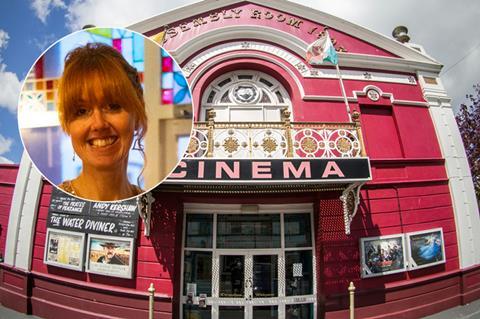
Sara Waddington, co-owner, Magic Lantern Cinema, Tywyn
What date are you reopening and with which films?
We hope to open on Friday, May 28 with Disney’s Cruella.
How are you preparing ahead of reopening your doors?
We are focusing on making the venue Covid safe but in keeping with the Magic Lantern sense of style. That means hand sanitisers on silver platters on red velvet covered tables, for instance. Two-metre distancing has been achieved by physically removing every other row of seats rather than roping off rows, which has enabled us to give everyone their own tables, to which we will offer waiter service.
What problems do you foresee reopening under the current restrictions?
The main one is the reduction in numbers caused by social distancing. At two-metres, we lose 16 seats for every one occupied. We have gone from a 280-seat venue to 140 and that is reduced hugely with social distancing rules. If people come on their own, we can only fit 25 people. With families of four to six, we can manage around 50. These numbers don’t really cover our costs so we have to rely more than ever on people purchasing items from our bar.
How would you describe the impact of the past year on your cinema?
Honestly, the impact has been weirdly positive. Firstly, it has caused us to be creative and make changes we probably never would have done such as removing the seats, which will likely be permanent as it makes for a much more comfortable experience for our customers. Secondly, creating an outdoor bar, which we did last year to bring in some money and keep ourselves busy. It was a massive success and is a gamechanger for the business going forward.
What do you have planned to encourage people back to the screen?
Our opening night is going to be a 70’s style fashion event to tie in with Cruella. We can’t create a full-on event just yet but I think people are desperate for a reason to dress up and experience a little glamour. We are also planning to create a movie-style trailer to remind people of the joy of watching a film on a huge screen with others and highlighting what we are doing to make everyone safe.
Is there anything that has come out of the past year that you think you might want to carry over?
The online booking system we needed to install was hugely helpful for us as we didn’t have one prior to Covid so wouldn’t know whether to expect 10 or 210 people, which always made staffing pretty tricky. I really hope people stay in the habit of booking in advance.
What are you most looking forward to, following reopening?
Hearing the Pearl and Dean music, smelling popcorn, pressing the button that sweeps open the beautiful gold screen curtains and dimming the lights. I can’t wait to show a film that will cause a room full of strangers to laugh and cry together.
Northern Ireland
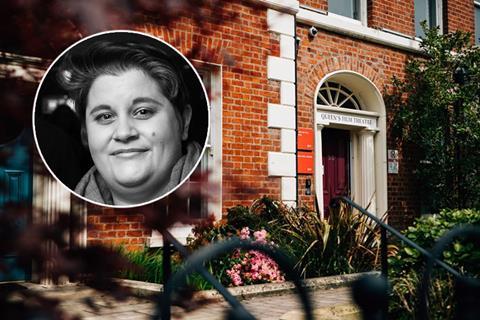
Joan Parsons, head of Queen’s Film Theatre, Belfast
What date are you reopening and with which films?
We are reopening QFT on May 24, with a jam-packed first programme. In the first 11 days, we’ll have Nomadland, Sound Of Metal, Judas And The Black Messiah, Apples, American Utopia, First Cow, The 8th, The Human Voice, Wolfwalkers and State Funeral. With only two screens it can be hard to fit things in so we’ve extended the programme to include mornings and late nights over the weekend.
How are you preparing ahead of reopening your doors?
We are preparing for tickets to go on-sale, testing social distance seating tech, membership updates, staff training, re-stocking the bar, checking through the risk assessment and much more. Many of the QFT staff have been on furlough for a long time so it is great to have the team back together for these last super busy couple of weeks [before reopening].
What problems do you foresee reopening under the current restrictions?
I don’t foresee any major problems with reopening, but social distancing means our capacities are reduced to around 25%. We are hoping that changes we have made to the system will allow for a few more seats to be sold but it will still cause a challenge until we can recover our full capacities. As a very busy cinema normally, we are used to operating at a high average occupancy, which we will not be able to do.
How would you describe the impact of the past year on your cinema?
The immediate impact is that QFT has been closed for most of the year, which is the longest pause in operations in over 50 years at the cinema. The long-term impact is hard to know as audience habits have been completely broken and the relationship that people have with cinemas has been changed. But I am confident that people have missed the cinema experience, which simply can’t be replicated at home.
What do you have planned to encourage people back to the screen?
Our programme will continue to provide a quality cultural offering for returning and new audiences. Over the first weekend, additional early matinees and late evening shows will help to increase access despite the limited capacities.
Is there anything that has come out of the past year that you think you might want to carry over?
Our biggest innovation has been online platform QFTPlayer, which launched at the beginning of the first lockdown and has just celebrated its first anniversary. We are working to enhance the offer and will continue to incorporate a digital programme to complement, contextualise and expand the QFT cultural programme. The way in which we use the platform is bound to change as we reopen but I am looking forward to experimenting with this in future.
What are you most looking forward to, following reopening?
I am so looking forward to catching up with QFT’s regular customers and welcoming them back to see some great films. I will be around a lot for the first few days as I want to say hello to lots of the customers and will stand at the back of the screen, listening to audience reactions. When we can welcome back one of our festival partners for full house screenings, I will finally feel fully ‘normal’.
Scotland
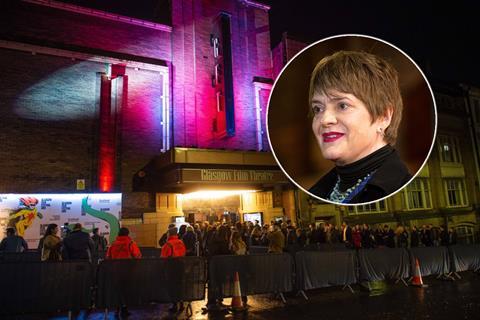
Allison Gardner, CEO, Glasgow Film Theatre
What date are you reopening and with which films?
We have chosen to reopen on May 24 because the Scottish government has a terrible habit of changing and it would be so disheartening if the date drifted by a week. We’re will reopen with Minari, Nomadland, Judas And The Black Messiah and Sound Of Metal.
What sort of problems do you face, reopening under the same restrictions as before?
The restrictions are such that we start haemorrhaging cash as soon as we reopen but I want to make sure we are doing everything in our power around safeguarding, to ensure that customer confidence is there.
How would you describe the impact of the past year on your cinema?
It has been devastating. There has been a massive drop in earned income, not being able to offer the usual broad range of films. But we were able to pivot to online quite quickly and investing in Glasgow Film At Home has really benefited us. The Glasgow Film Festival (GFF) was also massively more successful than I had anticipated, for which I am hugely grateful to audiences throughout the country. I feel we’ve done really well, under what were exceptionally difficult circumstances.
What do you have planned to encourage people back to the screen?
It’s in the curation of the titles. We were talking about screening films like Mank, for example, which we think is a film that ought to be seen on the big screen with a couple of shows of Citizen Kane. Going back to that more interesting curatorial approach.
Is there anything that has come out of the past year that you think you might want to carry over?
What we’re discussing now is how Glasgow Film At Home works much more as an audience development tool, as opposed to just a streaming service. While that was useful in lockdown, I suspect that that will slow down significantly when we reopen the doors. But how do we use that tool to perhaps offer more access for those people that we haven’t been able to reach before? It will be about increasing accessibility.
What are you most looking forward to about reopening?
You can’t underestimate the joy of curating a programme and the joy of interacting with an audience around a curated programme. I’m also looking forward to seeing all my colleagues again. I will be working shifts in the evening and will be in the cinema because I love talking to the audiences. In the independent sector, we’ve shown our strength by having a robust business model and it’s important that we don’t lose sight of that strength and communicate that strength to let people know we are extremely important in our communities and should not be undervalued in any shape or form.
London
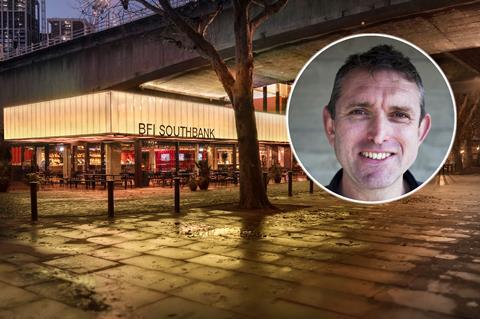
Stuart Brown, head of programmes and acquisitions, BFI Southbank
What date are you reopening and with which films?
May 17. Our programme through May and June features a major Robert Altman retrospective and a season celebrating iconic, powerful black women singers who have inspired millions with their voices called ‘Her Voice’. We also have ‘Dream Palace’, a season that speaks directly to the moment of re-opening and sees a host of cinema luminaries choosing a film that they want to see on our big screen.
How are you preparing ahead of reopening your doors?
There is an incredible amount of operational and health and safety work that is going into ensuring our environment is safe for audiences and our teams. We established a Covid-safe operation last year for the September reopening and we’ll be reopening with those robust health and safety measures in place once again. We have also taken the opportunity to undertake a major refurbishment of our largest cinema, NFT1. We have installed a new screen, sound system, laser projector and permanently wheelchair accessible stage.
What problems do you foresee reopening under the current restrictions?
Social distancing is a huge challenge to running a cinema. Not being able to fill the majority of your seats is devastating for any business but exhibitors are together in the understanding that we need do all we can to get audiences back to cinemas and the objective in the short term is to build consumer confidence. The fact that the vaccine roll out has been such a success is playing a positive role.
How would you describe the impact of the past year on your cinema?
The biggest effect is probably the impact on the theatrical window, which represents a paradigm shift. While audiences were obviously already embracing streamers, Covid has accelerated inevitable change. But it’s positive in that both distributors and exhibitors will be more creative and there will be more opportunity for independent, arthouse films. I hope this will lead to audiences being more adventurous.
What do you have planned to encourage people back to the screen?
Audience appetite for film hasn’t dimmed during the pandemic so the single most important thing in terms of getting people back is reassuring them with simple, clear health and safety measures that protect them and our staff. We felt having introductions – a mixture of pre-recorded and in person – for our ‘Dream Palace’ season would also be great audience driver, giving people a chance to hear directly from filmmakers like Edgar Wright, Gurinder Chadha and Francis Lee.
We also have an ongoing ticket offer for audiences aged 25 and under, which gives them £3 tickets to all films. In the past, the offer has only been on the day but we’ve made it available to book in advance and it’s working really well. We’ve also programmed some of the major awards films that haven’t been seen on the big screen yet, like Nomadland and Sound Of Metal.
Is there anything that has come out of the past year that you think you might want to carry over?
We have significantly grown the audience for our streaming platform BFI Player and established new online event series BFI at Home, which is presented for free on YouTube. These routes to audience are really important to us as they take our programme across the UK and beyond, and going forward we will programme even more projects across multiple platforms. We are learning new skills and new ways of working that we will hang on to and evolve further.
What are you most looking forward to, following reopening?
Watching films on the big screen, in the dark, with others… and having a beer with friends after and chatting about the film. Honestly, it feels like Christmas.
























No comments yet